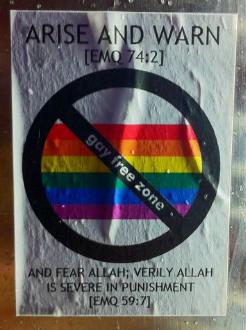 The Telegraph reports that a youth named Mohammed Hasnath has been fined for posting up some of the offensive “gay free zone” stickers that appeared in Tower Hamlets earlier this year.
The Telegraph reports that a youth named Mohammed Hasnath has been fined for posting up some of the offensive “gay free zone” stickers that appeared in Tower Hamlets earlier this year.
It is good that a conviction has been secured in connection with that disgraceful campaign, but it would be even better if the police could identify and charge the people who produced the stickers and gave them to Hasnath – as it is they, rather than a naive-sounding 18-year-old, who are the real villains of the piece.
Judging by the Telegraph report Hasnath was convicted under Section 4A of the Public Order Act, which criminalises the display of “any writing, sign or other visible representation which is threatening, abusive or insulting” with “intent to cause a person harassment, alarm or distress”. In his defence Hasnath stated that he was merely expressing his belief that homosexuality is a sin and had not actually threatened anyone – “it doesn’t say that I am going to punish them it just says what God says in the Koran”.
It will be interesting to see if those right-wing – and liberal – commentators who have defended Geert Wilders’ right to free speech will do the same for Mohammed Hasnath. You can bet they almost certainly won’t. Yet, just as members of the LGBT community should be able to go about their lives in Tower Hamlets without suffering abuse and harassment from homophobes, the Muslim community in the Netherlands should equally have the right to live in peace without a far-right politician inciting hatred against them. Freedom of expression is not absolute in either case.
Update: It turns out that Hasnath wasn’t charged under Section 4A of the Public Order Act but under Section 5, which criminalises the display of “any writing, sign or other visible representation which is threatening, abusive or insulting, within the hearing or sight of a person likely to be caused harassment, alarm or distress thereby”.
Rainbow Hamlets have issued a press release criticising British Transport Police and the Crown Prosecution Service for not proceeding with a charge under 4A, which is a more serious offence. However, 4A requires the prosecution to prove intent, which is almost impossible to establish. (That is one reason why the law against incitement to religious hatred, which also requires proof of intent, is completely useless.) So, to be fair to the CPS, they drew the not unreasonable conclusion that a prosecution under 4A would be likely to fail.
